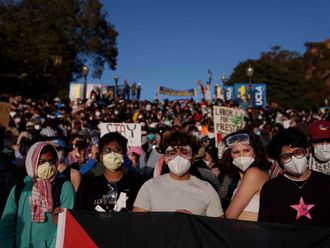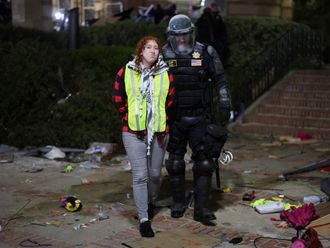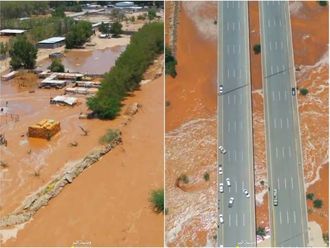Washington: A record number of Central American families fleeing violence crossed the US-Mexico border in the most recent fiscal year and total apprehensions were up, according to figures released by the US government.
While the exodus is smaller than two years ago, when an influx of unaccompanied Central American children stunned unprepared officials, the number of youngsters accompanied by relatives was the highest ever, the data released on Monday showed.
That’s an indication that the administration’s strict policy of raiding homes and deporting migrants, while also attempting increased levels of diplomacy in Central America, isn’t entirely working. Apprehensions by US Customs and Border Protection in the year ended September 30 totalled almost 409,000, up 23 per cent over fiscal 2015.
“Unaccompanied children and families have presented new challenges in our immigration system,” said Jeh Johnson, secretary of the Department of Homeland Security, in a statement.
“We are determined to treat migrants in a humane manner. At the same time, we must enforce our immigration laws consistent with our enforcement priorities.”
Immigration has been a flash point in the presidential race between Hillary Clinton and Donald Trump, who are both fighting to woo Hispanics, a critical voting bloc comprising 27 million voters. Republican Trump has blamed Mexicans for “taking our jobs” and has advocated deporting the 11 million undocumented immigrants living in the US Clinton, a Democrat, has said she will push for comprehensive reform while at the same time helping legalise those in the country without documentation.
The migrant crisis that began in 2014 has been a politically tricky issue for President Barack Obama’s administration, which has formally removed more people from the US than any other. Obama’s policy of sending back Central American children and their families has roiled immigration groups.
Complicating matters, the administration announced last month that it would resume deportations of Haitian migrants seeking asylum after the devastating 2010 earthquake in the Caribbean nation. Scores of Haitians had been waiting for legal acceptance and advocacy groups were stunned when Johnson made the announcement.
“Obama made a commitment after the earthquake saying we would not forsake Haiti,” said Jennifer Johnson, border policy adviser of the Southern Border Communities Coalition. “We really need a continuance of that commitment.”
The Obama administration has established an in-country referral program in Honduras, El Salvador and Guatemala that allows would-be migrants to apply for refugee status before they embark on the treacherous 2,500-mile journey to the US Johnson also announced Monday that the US has “resolved to create” a permanent working group with Mexico to address security issues, including fortifying that nation’s own southern border to stem the tide of migrants passing north.
Still, analysts say the administration hasn’t done enough to address the administrative and judicial side of the problem in the US, specifically the years-long wait to process asylum claims.
“Those systems in the US are deeply backlogged,” said Doris Meissner, director of the US immigration policy programme at the Washington-based Migration Policy Institute. “That serves as its own incentive to try to get to the United States, because it means once you get here, as a mother with young children for instance, you will be here for several years before you even have your hearing.”










_resources1_16a3106a819_small.jpg)

